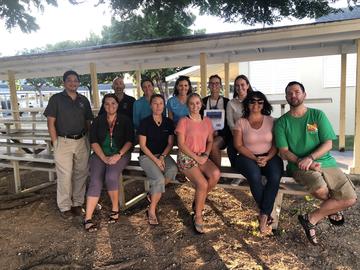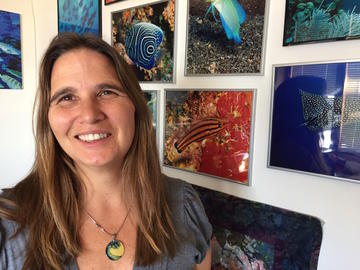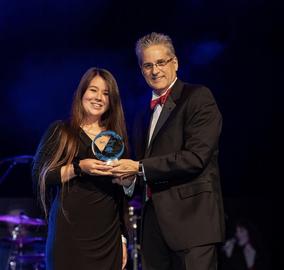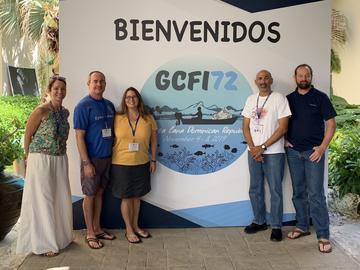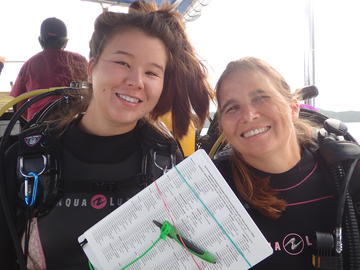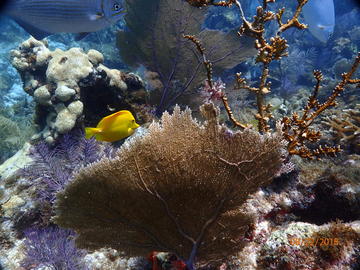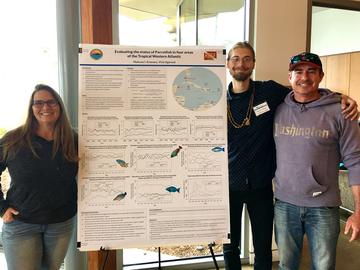In November 2019, REEF and the Cayman Islands Department of the Environment (DOE) presented Grouper Education Program teacher workshops on Grand Cayman and Cayman Brac in the Cayman Islands. The workshops, led by Grouper Moon educator, Todd Bohannon, and Bradley Johnson from DOE, provided educators with a marine science curriculum based on the Grouper Moon Project for intermediate/elementary and high school students.
REEF's Director of Science, Dr. Christy Pattengill-Semmens, was voted on to the Board of Directors of the Gulf and Caribbean Fisheries Institute (GCFI) at the GCFI Conference earlier this month.
We are excited to share that REEF’s Amy Lee was awarded the Diving Equipment & Marketing Association (DEMA)'s Wave Makers award for 2019 last weekend at the DEMA Show in Orlando, Florida. She was selected for this early career award for the impact she is having through conservation and education initiatives in the dive industry. Amy is REEF’s Trips Program and Communications Manager and has been part of our staff team since 2015. Through all aspects of her work, Amy strives to merge her passions for diving, communication, science, and travel.
REEF staff and partners just returned from the annual Gulf and Caribbean Fisheries Institute (GCFI) conference, held this year in the Dominican Republic. REEF’s programs and data were represented to the GCFI community by REEF Director of Science, Christy Pattengill-Semmens, and REEF Invasive Species Program Manager, Alli Candelmo, as well as our partners from Scripps Institute of Oceanography (Brice Semmens), Oregon State University (Scott and Selina Heppell), and Cayman Island Department of Environment (Bradley Johnson).
An overview of a scientific paper published in January 2019, documenting a precipitous decline in Sunflower Sea Star, primarily linked to the devastating sea star wasting disease epidemic that was wide-spread along the US and Canadian west coast starting in 2013, as well as warming ocean temperatures. The study used almost 11,000 REEF Volunteer Fish Survey Project surveys collected between California and Alaska between 2006 and 2017 to evaluate the massive decline.
We are excited to share that Amy Lee has been selected by the Diving Equipment & Marketing Association (DEMA) Awards Committee as one of four finalists for the 2019 DEMA Wave Makers Award, an early career award for those making an impact in the diving industry.
A new paper was recently published in the scientific journal, BioInvasions Records, that provides an updated look at non-native marine fishes that have been reported from Florida waters through REEF's Non-Native Species Reporting Program and other sources. The paper also provides information on Early-detection/Rapid-response (ED/RR) efforts. In addition to the well-known invasion of non-native lionfish (Pterois volitans and P. miles), there are now 39 other non-native marine fishes that have been documented in Florida.
This paper provides an updated look at non-native marine fishes that have been reported from Florida waters, following up on two previous papers (Semmens et al 2004 and Schofield et al 2009). The paper, co-authored by staff from REEF and the US Geological Survey (USGS), also provides information on Early-detection/Rapid-response (ED/ER) efforts.
Ciguatera fish poisoning is a global public health concern that is associated with Gambierdiscus, a genus of harmful algae found in coral reef environments that includes species known to produce toxins (ciguatoxins). It is thought that the pathway of Ciguatera toxins is through the food web, originating with herbivores that have fed on Gambierdiscus-associated macroalgae.
Herbivores play a critical role in balancing coral reef ecosystems. In the Caribbean, this role is mostly filled by parrotfish, surgeonfish, and sea urchins. Parrotfish take their important role one step further in that their constant scraping of algae growing on rock and dead coral results in a lot of poop, which is effectively the nice white sand found on beaches. A single parrotfish can generate up to 700 pounds of sand a year. Parrotfish are also a favorite food fish, and unfortunately their populations have been heavily depleted in many areas.

